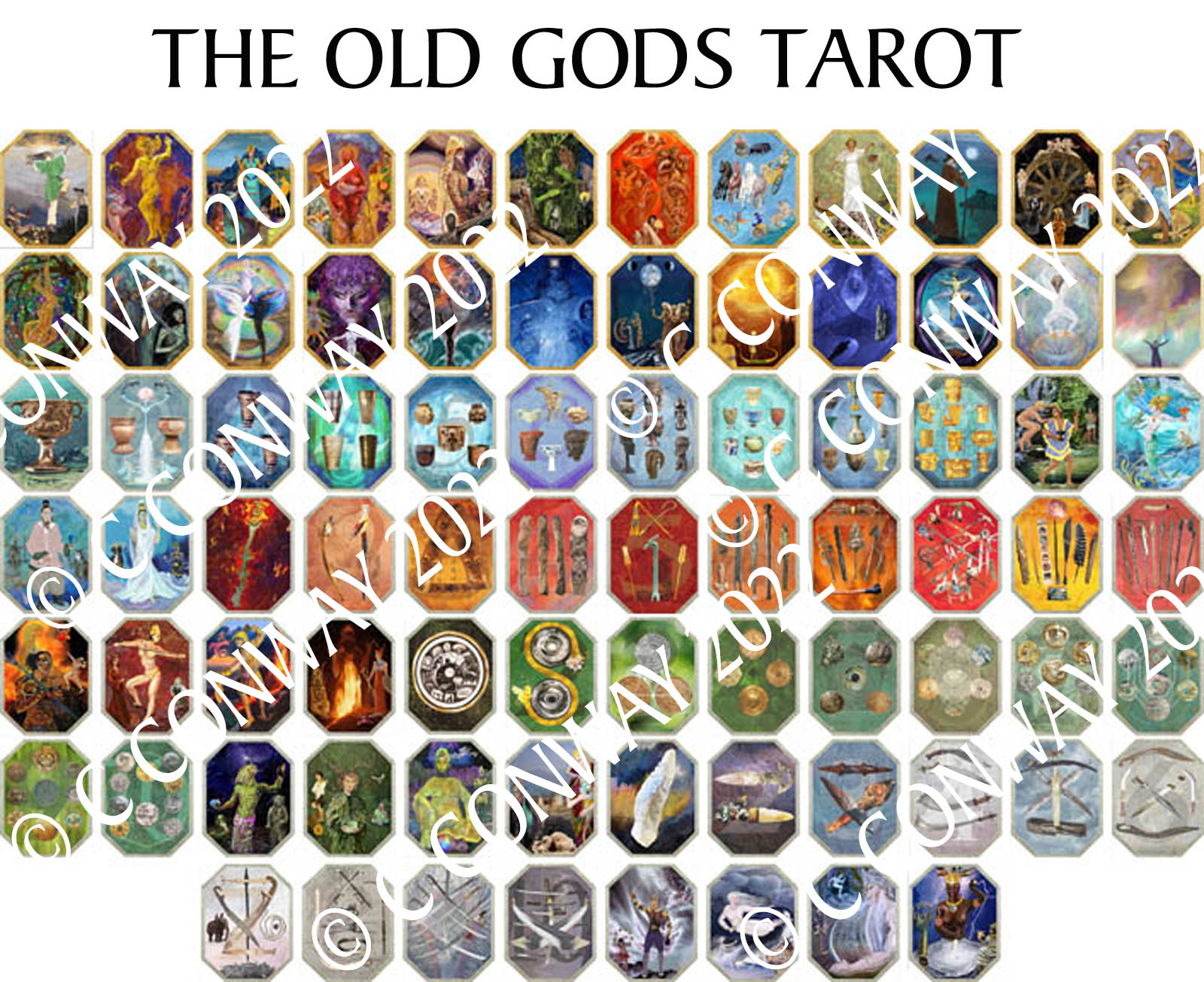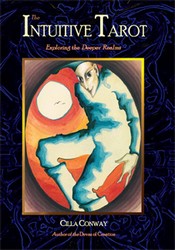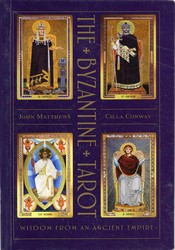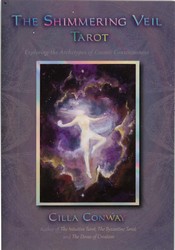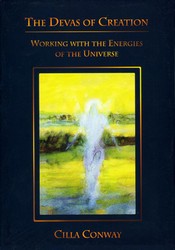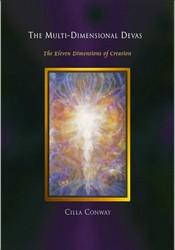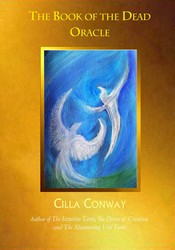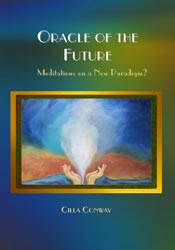Cilla Conway
The Old Gods Tarot
The Old Gods Tarot is available now. As you see from the above slide show, the cards are octagonal (not coffin-shaped, as a friend suggested) There are twenty-three Major Arcana in this deck – rather like the Shimmering Veil, I’ve included two Fools. Unlike the Shimmering Veil, though, there’s an extra, eightieth card, which I added more for myself than anything else – the Wild Gods. You’ll have to wait to see that one, as I’m not including it in the website.
As the deck was painted in Photoshop – (not in oils, though most of my previous decks were done in oils, with the exception of The Intuitive Tarot), it has a more graphic feel. Once I got used to creating digitally, I enjoyed it. I liked the fact that you can add (or delete, or revise) layer upon layer until the finished image is done. And the pip cards, which I thought would be a nightmare as I’ve never worked with a pip deck previously, turned out to be far more interesting than I expected.
Why did I decide on this deck, and why this medium? Years ago I read a book entitled ‘The Old Gods Laugh’. It wasn’t particularly wonderful (it was really chauvinist, even for the era), but the phrase stayed with me. I could see these massive beings, their laughs echoing through the heavens, as they decided whether to inflict the world with fire, a drought or a pandemic (they have been busy recently, haven’t they). As for working in Photoshop? I felt like a change, and a more precise set of images – I decided to have at least three gods in each Major Arcana, from very different areas of the world. Some have more than three, if I found interesting deities to include. The Empress, for instance has five – The Great Goddess, Nut and Isis, Cybele, Demeter and Persephone. You’ll find her below, together with a few of the Major Arcana.
The Major Arcana
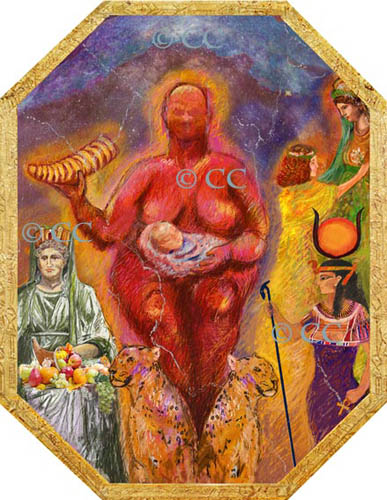
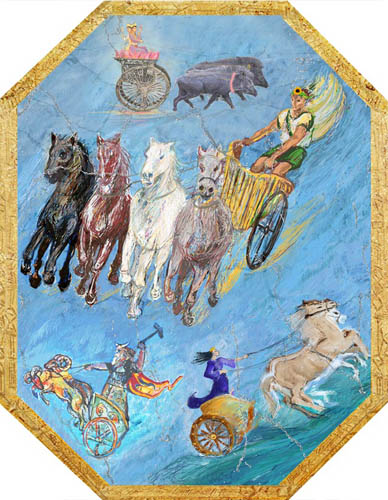
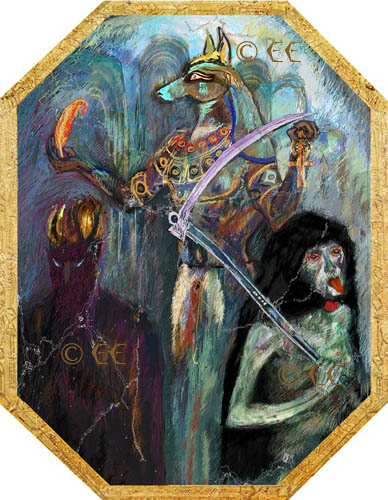
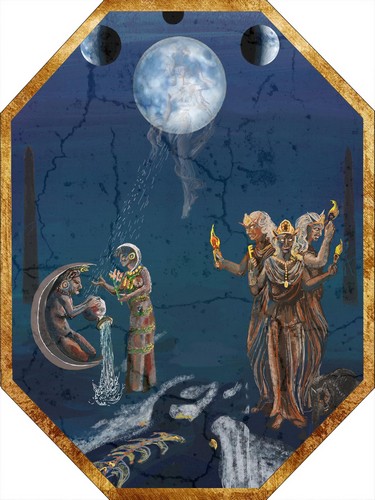
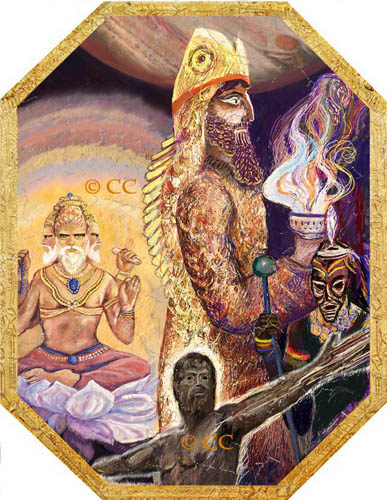

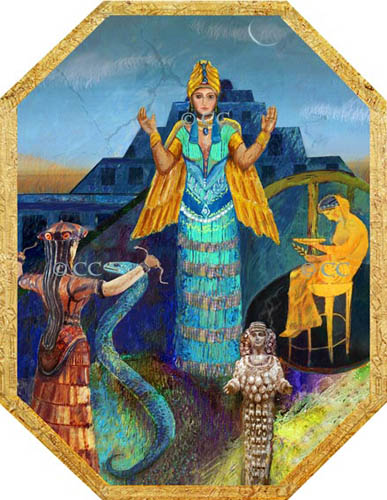
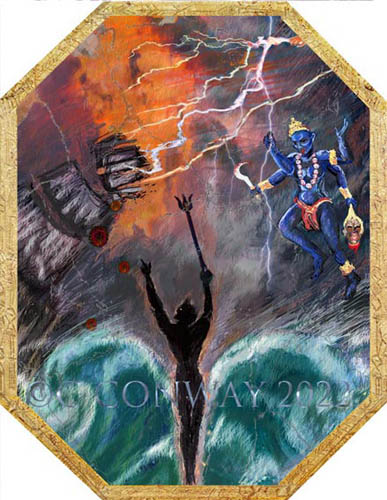
Creating a pip deck instead of my normal basic symbolic imagery was quite different. Numbers have their own magic which I almost managed to intuit in my teens, but I never managed to make the jump to calculus or esoteric mathematics. I did quite a bit of research on the magic of numbers and the way of reading a pip deck (mostly from two authors – Iva Kenaz’s Sacred Geometry and Magical Symbols (she also has a brilliant website), and Caitlin Matthew’s equally unmissable book, The Untold Tarot), while I painted, and I found it quite riveting.
I’m sorry to say that as far as I’m concerned there are no gods – humans created every single one of them, appalling families and all. Although, admittedly, I really enjoy one or two of the Old Gods… Years ago my family went on a cruise round the Greek Islands, and we were able to land on Sunion (Poseidon’s island) at dusk. It was the most magical experience . Then, later, as we were sailing around Naxos, I heard Pan’s pipes. Of course, it was ‘only’ wind in the rigging, but it didn’t feel like that. Unfortunately I chose not to go to Hera’s island, Samos, which I regret now.) Finally, another link with Poseidon. My father said he would offer a libation, but chose not to offer the best wine. I thought that was a mistake. It was. The next day we were sailing along and were caught by the Meltemi, the hot wind that can suddenly blow up in the Mediterranean. The yacht heeled over, my mother broke a rib, and my father lost his favourite pipe lighter. I, on the other hand, found a waterproof jacket in the sea. Not a very good one, but hey – I still have a soft spot for Poseidon and, of course, Pan, who was in the first draft of 0 The Fool, but had to be removed as he didn’t fit the design (hey-ho, the trials and tribulations of a tarot card designer).
The Minor Arcana
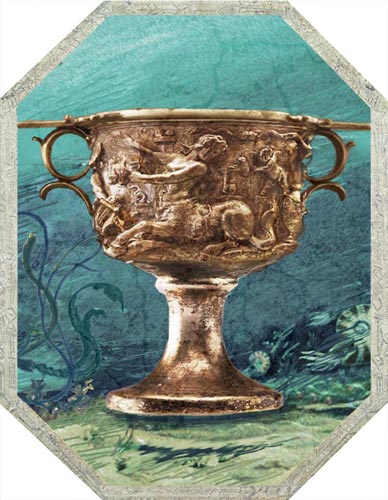
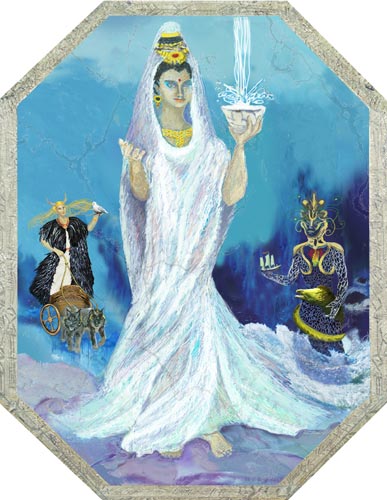
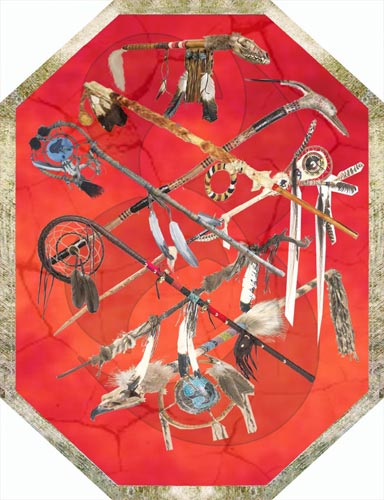
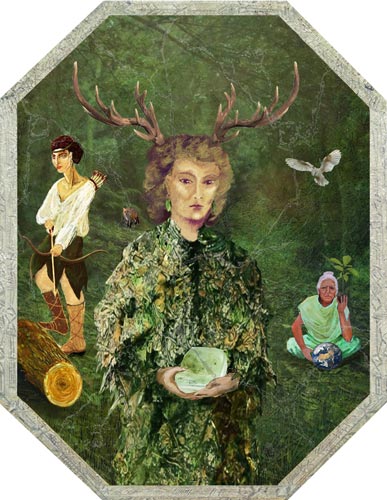
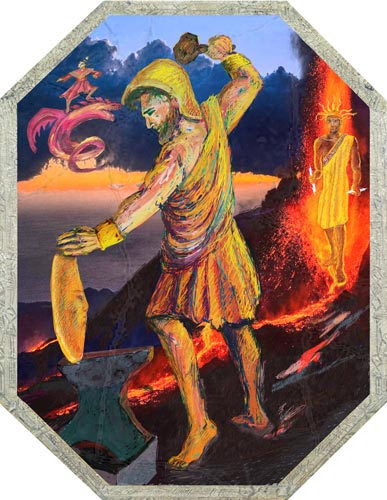
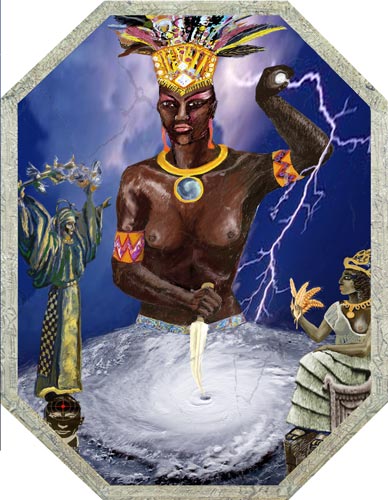
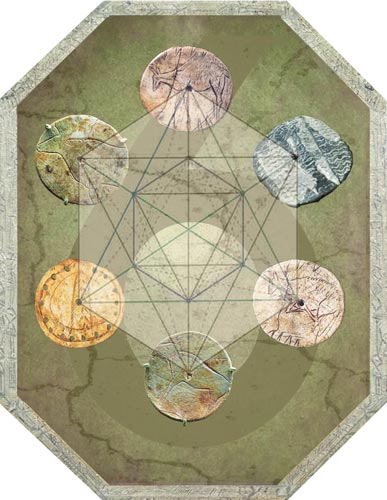
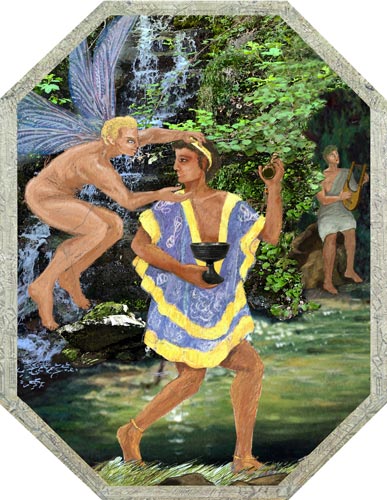
The face or court cards are fully pictorial, as you see above, but the pips are historical symbols – for instance, in the Six of Discs, you’ll six paleolithic discs – used presumably for weighing, counting or even for exchange. All the pip symbols are sourced from the internet (with the exception of a couple of Discs which are my own pen drawings) and I found it quite sad that so many of these wonderful items (medicine sticks, but Tibetan staffs, Egyptian cups, Chinese discs, etc.) are being sold on ebay or etsy.
The face cards – like the Major Arcana – depict more than one deity – usually three (the Majors may have more), and I have changed their order – the normal ‘pages’ are the Warriors, followed by the Princesses, then the Gods, and at the head of each suit, the Goddesses. This was a very interesting switch to make, as it entailed thinking about how this Old Gods tarot society would work. The Goddesses obviously would make the final decision on any suit question, assisted by the Gods. The Priestesses would be in charge of the spiritual wellbeing of the people, while the Warriors would deal with any incursion into their territory. Oh that we could reorder our society to match.
The Blades suit show knives and swords from various periods of history, and different places. They are coloured in shades of greys and pale blues. The Sceptres have fiery, hot colours, with sticks, as shown in the Eight above, which shows North American tribal medicine sticks and ‘coup’ sticks, a method to hit their enemies in battle as a sign of courage. Orbs are mostly green, and Chalices are turquoise and blue. I’ve used sacred geometry to identify the pip cards, and have also included a large half-tone number in the background. Today’s tarot convention is usually that Blades/Swords are connected with air, the mind and intellect; determination, the ability to visualise abstract concepts, while Sceptres (Batons) have been linked with fire, and thus creativity, passion, intuition, inner vision. The Orbs (Discs) are linked with earth, so are grounded, practical, down-to-earth, elemental. The Chalices suit has come to symbolise water and all the emotions of the psyche, empathy, and self-awareness, so they are turquoise and deep blues – though if you look at the Warrior of Cups (above), the main colour is green. This card amused me greatly. Nethuns, the Etruscan Warrior (though he doesn’t look very warrior-like here), seems to have been intending to talk to Orpheus when he was waylaid by Eros. The lascivious look on Eros’s face brings a whole new dimension to the myth of Eros and Psyche, and the list of impossible demands he told poor Psyche to resolve before he would forgive her for dropping candle wax on his face. Perhaps Eros was never into Psyche at all, as we are told in the myth? Well, you’ll find all that information in the book of the deck!
Below, is the whole deck in thumbnail format. It’s been available since the beginning of 2023.
I am also producing a Powerpoint presentation about the creation of the deck which I will post at the bottom when it’s finished. I’ve been asked so many times about how I create my decks and it probably doesn’t help anyone to say ‘with lots of work and help from friends…’
